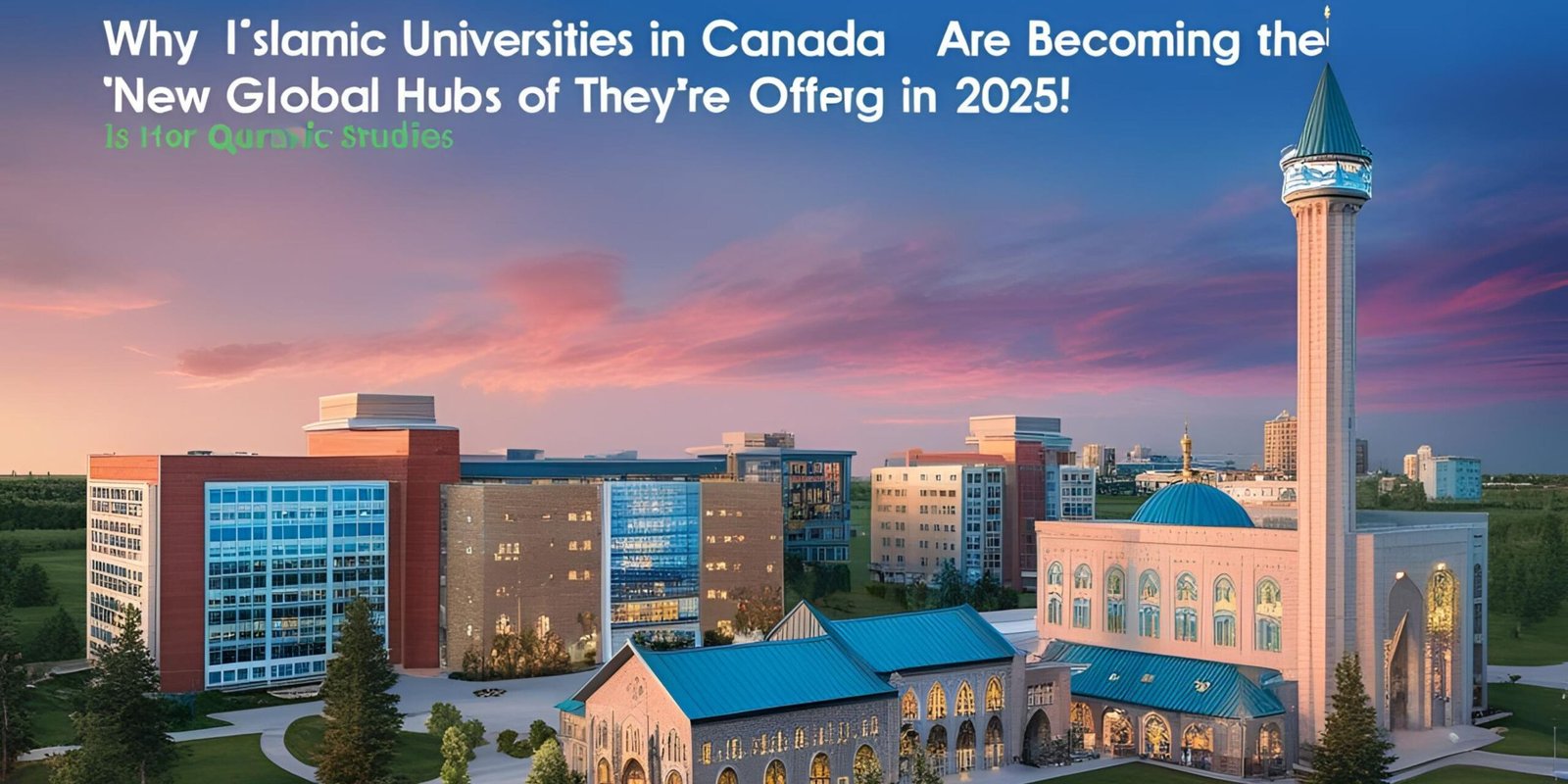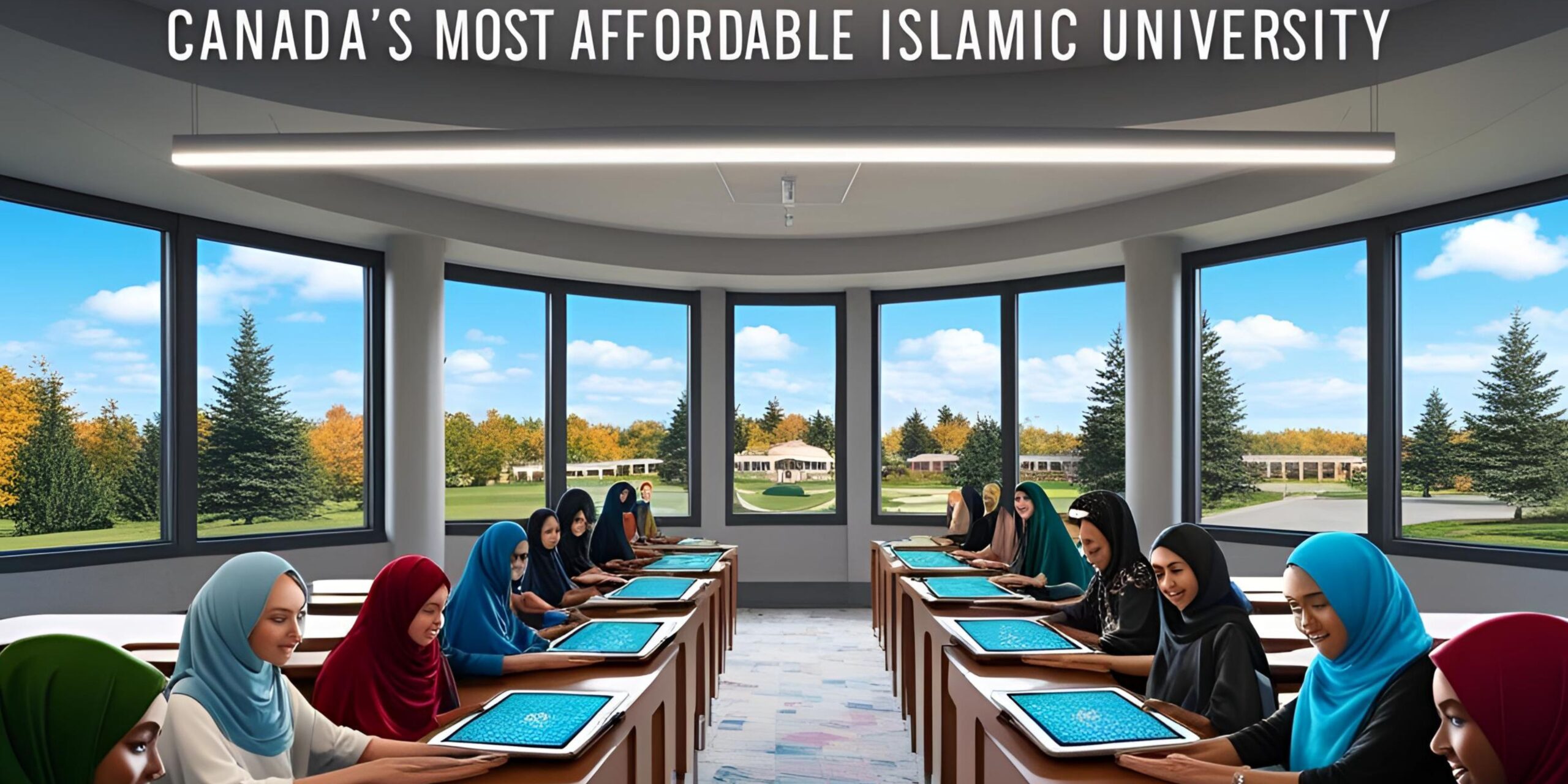In the past, when aspiring students dreamed of pursuing higher Islamic education, they turned their eyes toward Cairo, Medina, or Islamabad. Today, however, an unexpected yet powerful new player has emerged on the scene: Canada. Yes, you read that right. In 2025, Islamic universities in Canada are rapidly gaining international acclaim, and the reason might just leave you speechless.
Canada, known for its diverse society and progressive values, hosts dynamic Islamic educational institutions. These universities teach more than just the Quran and theology. They blend classical knowledge with modern technology. This approach offers a learning experience grounded in tradition while also preparing students for the future.So why are students from across the globe now choosing Islamic universities in Canada over traditional hubs? What are they offering that no one else is? Let’s find out.

A Shift in the Global Islamic Education Landscape
For decades, institutions like Al-Azhar in Egypt and the Islamic University of Medina were seen as the best in Islamic education. While these centres still hold influence, many students are now choosing Canadian Islamic universities. They are drawn by the **modern infrastructure, inclusive environment, and future-focused curriculum**.
Canada’s Islamic universities are not just catching up; they are leading the charge in making Quranic studies more accessible, interdisciplinary, and globally relevant. This shift is not just about location – it’s about innovation, inclusivity, and impact.
Read more:
A Glimpse Into the Leading Institutions
Universities like the Canadian Institute of Islamic Studies (CIIS) and Al-Qalam University of Toronto (fictional for illustrative purposes) are at the forefront. These institutions are now offering:
- AI-assisted Quran memorization and recitation platforms
- Blockchain-verified Ijazahs
- Dual-degree options combining Islamic theology with data science, education, or psychology
- Multilingual instruction in Arabic, English, and French
These features are pulling in students from the U.S., U.K., Malaysia, South Africa, and beyond.
Technology and Tafsir: Blending the Old With the New
What really sets Canadian Islamic universities apart is how they have embraced technology without compromising tradition.
Take, for example, the integration of AI tutors that assist in tajweed correction. With the help of machine learning, these platforms analyze pronunciation in real-time, offering personalized feedback. Another example is the use of augmented reality (AR) to recreate scenes from Islamic history, allowing students to visually experience pivotal events from the Quran.
These aren’t gimmicks. They’re carefully designed tools to enhance understanding, engagement, and retention of sacred knowledge.
An Inclusive Learning Environment
One of the biggest reasons international students are turning to Canada is its welcoming and diverse educational environment. In a world where many Muslim students face discrimination or feel alienated, Canada’s inclusive culture offers a safe space for learning and spiritual growth.
More than 45% of the student population at these Islamic universities are international, and over half are women. That’s not just progressive – it’s revolutionary.
Sana, a 22-year-old from Morocco, says, “What surprised me most wasn’t just the facilities but how open and supportive the faculty and classmates were. I feel empowered as a woman studying Islamic law here.”
Innovative Curriculum: Not Just Quran Memorization
Canadian Islamic universities understand that to produce well-rounded scholars, they need to offer more than traditional studies. That’s why their curricula often combine core Islamic subjects with contemporary fields.
Some of the standout courses include:
- Quranic Ethics in the Age of AI
- Climate Change in Islamic Jurisprudence
- Islamic Finance & Blockchain
- Gender Roles and Fiqh
- Media Literacy for Muslim Leaders
These subjects ensure students are not just scholars, but also leaders equipped to handle modern challenges through the lens of Islamic values.
Faculty That Bridges Generations and Continents
Another major strength lies in the faculty itself. Canadian Islamic universities are attracting global thought leaders. Their teams often include:
- Traditional Islamic scholars (Ulama) from institutions like Al-Azhar
- Canadian-born academics with PhDs in Islamic studies
- Tech and finance experts offering practical applications of faith in modern contexts
This cross-pollination of ideas creates a dynamic academic environment where old and new harmoniously coexist.
Affordability & Scholarships: High Value, Low Cost
Compared to Islamic institutions in the UK, US, or the Gulf, Canadian Islamic universities offer exceptionally affordable tuition rates. Many programs cost less than CAD $4,000/year, and online programs can go as low as CAD $1,200/year.
Moreover, there are generous scholarships for international students, particularly those from underserved regions or conflict-affected countries. This makes Canada not only a high-quality option but also one of the most accessible.
Online Programs: Learn from Anywhere in the World
In 2025, distance learning is no longer a luxury – it’s an expectation. Canadian Islamic universities are rising to the occasion with fully accredited online programs.
These platforms offer:
- Live and recorded lectures
- Online forums for peer interaction
- Virtual mentorship from scholars
- Digital certification and transcripts
Whether you’re in Jakarta, Johannesburg, or Jeddah, you can now access Canadian Islamic education from your laptop.
Women in Leadership: A Game Changer
One of the most empowering features of Canadian Islamic universities is their strong emphasis on female leadership in scholarship.
Women serve as:
- Professors of Hadith and Tafsir
- Program directors
- Guest lecturers on fiqh, ethics, and gender
Female students are not only welcomed but actively encouraged to pursue Ifta (Islamic legal authority). This breaks barriers many traditional institutions still uphold.
Interfaith Engagement and Public Outreach
Given Canada’s multicultural makeup, these universities place great emphasis on interfaith dialogue and community service. Students often participate in:
- Mosque open houses
- Public lectures with Christian and Jewish scholars
- Volunteering in humanitarian efforts
This approach fosters mutual respect and builds bridges between communities, making these students not just knowledgeable, but also compassionate leaders.
Career Opportunities and Accreditation
Islamic universities in Canada are not just teaching centers – they are launching pads. Thanks to national accreditation and partnerships, their degrees are recognized globally.
Graduates are moving on to careers in:
- Islamic banking
- Teaching in international schools
- Research and academia
- Policy advisory roles in think tanks and NGOs
Some even go on to establish their own madrasahs and institutions back home, bringing with them a blend of traditional wisdom and modern insight.
Student Life: A Cultural Tapestry
Campus life in these universities reflects the diversity of the Muslim Ummah. From halal cafeterias offering cuisines from every continent to student-led clubs for Quranic arts, social justice, and innovation, the experience extends far beyond the classroom.
FAQs
u003cstrongu003eAre these universities open to non-Muslims interested in Islamic studies?u003c/strongu003e
Yes, most Canadian Islamic universities offer programs for interfaith dialogue and academic Islamic studies open to all.
u003cstrongu003eDo I need to speak Arabic to enrol?u003c/strongu003e
Many programs begin with beginner Arabic, and some offer English or French tracks. Fluency is not required for all courses.
u003cstrongu003eIs the degree recognized internationally?u003c/strongu003e
Yes. Most Canadian Islamic institutions are either accredited or affiliated with recognized higher education frameworks.
u003cstrongu003eAre scholarships available for international students?u003c/strongu003e
Absolutely. Need-based and merit-based scholarships are offered, especially for students from low-income backgrounds.
Friday khutbahs are delivered in multiple languages. Taraweeh prayers during Ramadan fill the campus mosque. Spiritual retreats and academic symposiums are part of the yearly calendar.
The Shocking Twist: Islamic Education Meets Artificial Intelligence
In 2025, some Canadian Islamic universities are now piloting AI-powered learning companions. These tools can:
- Suggest reading materials based on your academic progress
- Analyze your recitation for flaws and recommend exercises
- Offer instant translations and Tafsir references from classical sources
This isn’t science fiction – it’s faith fused with the future.
And perhaps the most radical twist? Students can now publish their own peer-reviewed research on blockchain platforms, ensuring transparency and global accessibility.
Why This Matters
In a time where extremism, misinformation, and Islamophobia are rampant, Islamic universities in Canada are offering something rare and necessary: balanced, credible, and contextually relevant Islamic knowledge.
They are raising a generation of scholars, thinkers, and professionals who are not only spiritually grounded but intellectually empowered. And in doing so, they’re transforming Canada into a global hub of Islamic learning.
This isn’t just a regional trend – it’s a global movement.
























Post Comment